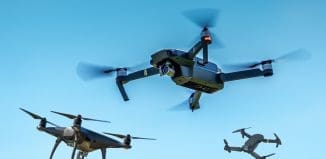Drones Changing Rules Of The Game In Disputed Areas
This post is also available in:  עברית (Hebrew)
עברית (Hebrew)
China has now firmly established itself as leading player in the worldwide arena of unmanned aerial vehicle (UAV) manufacturing. Some of the country’s products are already being used in conflict areas in Pakistan, Iraq, Syria, and North Korea.
Iraqi forces have been using Chinese drones against ISIS, with observers reporting heavy damage inflicted on the group in mid-December.
“Many of the Chinese drone manufacturers are selling small UAVs capable of battlefield reconnaissance and some that can now be equipped with missiles,” said Michael Boyle, senior fellow at the Foreign Policy Research Institute.
For the time being, China trails American drone manufacturing capabilities. But due to the tight restrictions imposed by the US Congress on drone exports, China has a huge export potential, Boyle said. As US technology is not available to many countries in South America, Africa, the Middle East, and Asia, Chinese manufacturers can expect to find good markets in these regions.
UAVs are likely to play a key role in disputed areas, notably in the South China Sea and the East China Sea. Japan is likely to operate American Hawk drones to protect its interests in the area, prompting China to deploy its own UAVs to counter them.
“The area over the disputed islands in the South China Sea and the East China Sea is increasingly a prime area for drone competition. They have a number of advantages: drones can identify changes on the ground in the islands and provide photographic evidence of military build-ups,” Boyle said.
Drones can, and likely will, act as a reset switch for global military competition. In many ways, they can level the playing field and dramatically alter the rules of the game. The US, however, is still likely to remain a leader in at least one way drones are being used.
“Few, if any, states will use drones in the way that the United States currently does, as a way to ruthlessly target militant networks in ungoverned territories,” Boyle said. But they can provide capabilities many smaller nations had no access to until now.




























